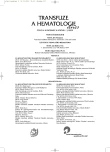-
Medical journals
- Career
Impairment of fertility and its preservation in patients undergoing systemic chemotherapy for Hodgkin lymphoma, summary and authors experiences
Authors: L. Šmardová 1; Martin Huser 2; Z. Král 1; I. Crha 2; I. Vášová 1; B. Wagnerová 1; J. Mayer 1; J. Vorlíček 1
Authors‘ workplace: Interní hematoonkologická klinika, FN Brno 1; Gynekologicko-porodnická klinika, FN Brno 2
Published in: Transfuze Hematol. dnes,11, 2005, No. 4, p. 162-169.
Category: Comprehensive Reports, Original Papers, Case Reports
Overview
The most serious problem resulting from the chemotherapy of patients with Hodgkin lymphoma represents progression into the late effects of treatment, including gonadal toxicity. Consequently authors present here summary of risks regarding early ovarial failure in women and impairment of testicular function in men that are treated by chemotherapy and radiotherapy. The authors mentioned their own experiences too. Current means of preservation of reproductive status of young patients undergoing cytostatic treatment are summarized. Particularly means of pharmacological preservation of ovarial functions by administrating gonadotropin-releasing hormone analogues as well as methods of assisted reproduction.
Key words:
Hodgkin lymphoma, gonadal toxicity, early ovarial failure, gonadotropin-releasing hormone analogues, sperm kryoconzervation, assisted reproduction
Labels
Haematology Internal medicine Clinical oncology
Article was published inTransfusion and Haematology Today

2005 Issue 4-
All articles in this issue
- A combined antigen-antibody HCV detection assay
- Could lupus anticoagulants presence influence anticoagulant treatment in patients with antiphospholipid syndrome?
- ProC®global in patients with antiphospolipid antibodies
- Impairment of fertility and its preservation in patients undergoing systemic chemotherapy for Hodgkin lymphoma, summary and authors experiences
- History and present of the treatment of lymphoblastic leukemia in children
- Transfusion and Haematology Today
- Journal archive
- Current issue
- Online only
- About the journal
Most read in this issue- Could lupus anticoagulants presence influence anticoagulant treatment in patients with antiphospholipid syndrome?
- A combined antigen-antibody HCV detection assay
- History and present of the treatment of lymphoblastic leukemia in children
- ProC®global in patients with antiphospolipid antibodies
Login#ADS_BOTTOM_SCRIPTS#Forgotten passwordEnter the email address that you registered with. We will send you instructions on how to set a new password.
- Career

